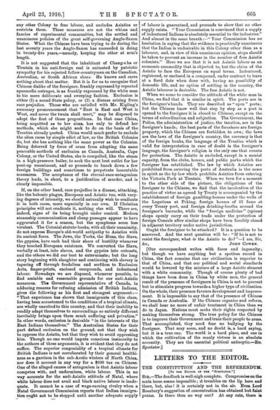LETTERS TO THE EDITOR.
THE CONSTITUTION AND THE REFERENDUM.
[TOTHE EDITOR OF THZ "SPECTATOR."] Sin,—The deadlock is well-nigh complete. Compromise on the main issue seems impossible ; it trembles on the lip here and there, but, alas ! it is certainly not in the air. Even Lord Rosebery's suggestion of concentration has obtained but faint praise. Is there then no way out P At any rate, there is still five weeks' breathing-space—still a working week before this fateful spring Recess—and I venture to appeal to that in:ddle party which is voiced by the Spectator (if it has as yet no other existence) to make itself heard and felt in the interval. Nay, I even hope some echo may reach the leaders of contending parties.
What is the distinctive feature of the present crisis P We have had serious conflicts between the two Houses of late years ; we have even had grave crises within the last genera- tion, but hardly within living memory has there been one involving the Crown. And it will be remembered that the last threatened deadlock, that on Redistribution in 1884, was averted largely through the instrumentality of the Crown acting as an angel of peace. The Crown is now invited to bring, not peace, but a sword. Our Sovereigns in the past have, it is true, of their own motion sought to decide the fate of parties ; but never since the Revolution has the Crown been advised by Ministers to take sides in a struggle still undecided. Many and important as are the contentious questions now dividing us which may lead to acute crises, and even to deadlocks, there is no other single one which involves the Crown in this way. The situation is not merely exceptional, it is unique.
And remember that once a &cum' Election is joined on this issue, it will be impossible to screen the King. However discreetly the Prime Minister may frame his " contingent advice" (and his latest utterance is still very guarded), how- ever loyally the Unionist leaders may strive to keep the screen up, the fierce light will beat not only on the Throne, but on the person of the Sovereign, from every election platform in the kingdom. I need not dwell on the "contingent guarantees," of which it is hard to speak with the moderation I desire at this juncture. But the problem out-Daniels Daniel. The King is to be expected not only to interpret the "veto" dreams of the country—to estimate and weigh their substance—but to guess them ; and not only to guess them, but to guess them in advance. And all the time he is the only person concerned whose mouth is closed.
Now ought not all parties to vie with each other in devising means to avert such a peril, the extent or limits of which can hardly be foreseen ? Can it be done P Is there any way out ? I believe there is one, and only one. You, Sir, have been preach- ing the Referendum for years as a solution of intercameral differences generally. I will not go into the general question, on which I confess there seems much to be said on both sides. But as an emergency solution of this unique difficulty, an ad hoc Referendum appears to present immense advantages with few drawbacks. Its mere novelty, of course, is an objection, but the situation will not brook delay ; and however novel, the remedy is in no wise a desperate one, though the situation is rapidly becoming BO. It was seriously discussed last year, not only in your columns, but in many other newspapers, with reference to the Budget; and financial questions are obviously those least suited to such treatment, just as Constitutional questions are admittedly best suited,—in Switzerland the Budget is expressly excluded from the Referendum. The most serious objection, to my mind, to a general Referendum has always seemed to be the danger of undermining Parliamentary responsibility; but this attaches to the habitual use of the instrument, and does not apply to an exceptional ad hoc measure. There is, indeed, one objection which is equally applicable in both cases,—viz., the difficulty of explaining the issue to the masses of the electorate. But this would not be obviated by having recourse to a General Election, where the issues would be many and complicated, and where the response of the electors might be even more unintelligible than the questions put to them.
I will not now discuss details. Difficulties no doubt there would be in framing a scheme, but all surmountable if the will is there. Legislation would be necessary, of course, and for this the consent of both parties would be required. But if feasible, and if, as I believe, it is the only way, ought it not to be attempted, or at any rate discussed ? Indeed, I see no reason why the Lords should not themselves lay down the principle of the Referendum, and consent to discuss the Government Resolutions on condition of the Bill to embody them being submitted in that way to the electors.—I am,
out here that the Lords could add a Referendum clause to the so-called -Veto Bill when it reaches them, and add also a schedule prescribing the machinery for taking a poll of the people. It would then be for the House of Commons to decide whether it would reject the clause and schedule. No doubt it would reject it. That does not, however, seem to us a reason why the Lords should refrain from the course we have indicated,—a course which would, we believe, commend itself to the country as reasonable and essentially democratic in spirit.—En. Spectator.]















































 Previous page
Previous page